Related Research Articles

The Eastern Catholic Churches or Oriental Catholic Churches, also called the Eastern-Rite Catholic Churches, Eastern Rite Catholicism, or simply the Eastern Churches, are 23 Eastern Christian autonomous particular churches of the Catholic Church in full communion with the pope in Rome. Although they are distinct theologically, liturgically, and historically from the Latin Church, they are all in full communion with it and with each other. Eastern Catholics are a minority within the Catholic Church; of the 1.3 billion Catholics in communion with the pope, approximately 18 million are members of the eastern churches. The largest numbers of Eastern Catholics are found in Eastern Europe, Eastern Africa, the Middle East, and India. As of 2022, the Syro-Malabar Church is the largest Eastern Catholic Church, followed by the Ukrainian Greek Catholic Church.

An exarch was the holder of any of various historical offices, some of them being political or military and others being ecclesiastical.
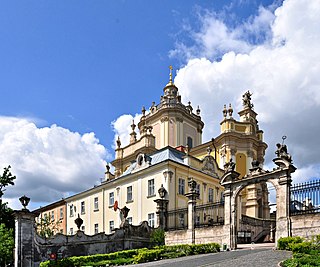
The Ukrainian Greek Catholic Church (UGCC) is a major archiepiscopal sui iuris ("autonomous") Eastern Catholic church that is based in Ukraine. As a particular church of the Catholic Church, it is in full communion with the Holy See. It is the third-largest particular church in the Catholic Church after the Latin Church and the Syro-Malabar Church. The major archbishop presides over the entire Church but is not distinguished with the patriarchal title. The incumbent Major Archbishop is Sviatoslav Shevchuk.

Joseph Anthony Ferrario was the third bishop of the Roman Catholic Diocese of Honolulu and served from 1982 to 1993.

The Catholic Church in Georgia, since the 11th-century East–West Schism, has been composed mainly of Latin Church Catholics; a very large community of the Armenian Catholic Church has existed in Georgia since the 18th century.

The Catholic Church in Ukraine is part of the worldwide Catholic Church, under the spiritual leadership of the Pope in Rome. Catholics make up 10% of the population of Ukraine.

The Catholic Church in Haiti is part of the worldwide Catholic Church, under the spiritual leadership of the pope, the Curia in Rome and the Conference of Haitian Bishops.

The Catholic Church in Nicaragua is the Nicaraguan part of the worldwide Catholic Church, under the spiritual leadership of the Pope, curia in Rome, and the Conference of Nicaraguan Bishops.
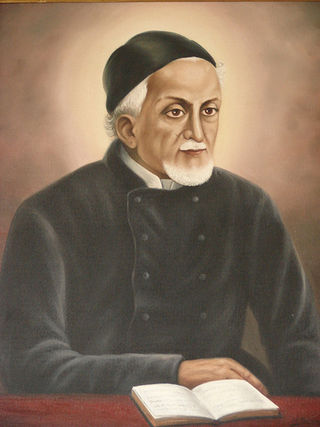
The Stigmatines, officially named the Congregation of the Sacred Stigmata, is a Catholic clerical religious congregation of Pontifical Right for men. The Stigmatine Congregation was founded on November 4, 1816 by Gaspar Bertoni, in Verona, Italy. Its members use the post-nominals C.S.S..
The history of the Eastern Orthodox Church is the formation, events, and transformation of the Eastern Orthodox Church through time. According to the Eastern Orthodox tradition, the history of the Eastern Orthodox Church is traced back to Jesus Christ and the Apostles. The Apostles appointed successors, known as bishops, and they in turn appointed other bishops in a process known as Apostolic succession. Over time, five Patriarchates were established to organize the Christian world, and four of these ancient patriarchates remain Orthodox today. Orthodox Christianity reached its present form in late antiquity, when the ecumenical councils were held, doctrinal disputes were resolved, the Fathers of the Church lived and wrote, and Orthodox worship practices settled into their permanent form.
Armenians in Georgia or Georgian Armenians are Armenian people living within the country of Georgia. The Armenian community is mostly concentrated in the capital Tbilisi, Autonomous Republic of Abkhazia and Samtskhe-Javakheti region. 2014 Census of Georgia puts the Armenians in Samtskhe-Javakheti at 50.5% of the population. In Abkhazia, Armenians are the third largest ethnic group in the region after the Georgians and the Abkhazian majority.

The Roman Catholic Archdiocese of Kaduna {Kadunaën(sis) in Latin} is the Metropolitan See for the ecclesiastical province of Kaduna in Nigeria.
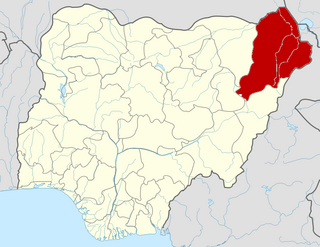
The Diocese of Maiduguri is a Latin Church diocese of the Catholic Church located in the city of Maiduguri in the ecclesiastical province of Jos in Nigeria.

The Diocese of Sapporo is a Latin Church diocese of the Catholic Church located in Sapporo, Japan.

Gaspare Luigi Bertoni, CSS was an Italian Catholic priest and the founder of the Congregation of the Sacred Stigmata, also known as the Stigmatines.

The Catholic Church in Abkhazia is the third largest Christian denomination in the territory of the Republic of Abkhazia, which is part of the worldwide Catholic Church in communion with the Pope. Most Christians in Abkhazia are Orthodox, see Religion in Abkhazia. Due to Abkhazia's partial recognition, administration of Catholics comes from Catholic dioceses in Russia. The Catholic Church in Abkhazia mainly consists of Armenians, Poles, and expatriates living in Abkhazia. The Holy See does not have diplomatic relations with Abkhazia, but has enjoyed two high level visits from the apostolic nuncio.

The Apostolic Administration of the Caucasus is an apostolic administration of the Latin Church in the Catholic Church, established in 1993, with headquarters in Tbilisi, capital of Georgia.
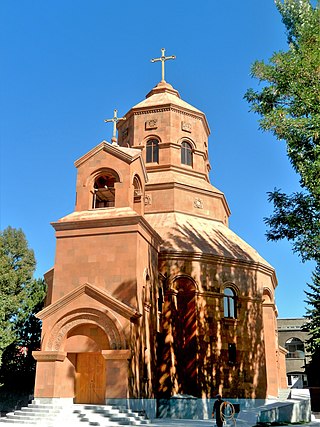
The Armenian Catholic Ordinariate of Eastern Europe is an Ordinariate (quasi-diocese) of the Armenian Catholic Church for its faithful in certain Eastern European ex-Soviet countries without proper Ordinary for their particular church sui iuris.

Stanislav Shyrokoradiuk, O.F.M. is a Ukrainian prelate of the Catholic Church who became Bishop of Odesa-Simferopol since February 2020 after a year as Coadjutor Bishop there. He was Bishop of Kharkiv-Zaporizhzhia from 2014 to 2019 and Auxiliary Bishop of Roman Catholic Diocese of Kyiv-Zhytomyr from 1994 to 2014.
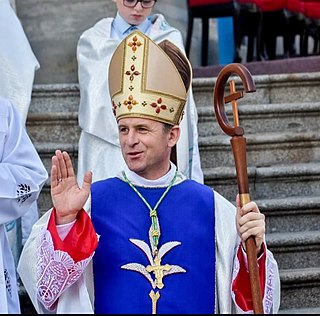
Bishop Pavlo Honcharuk is a Ukrainian Roman Catholic prelate who serves as a Diocesan bishop of the Kharkiv-Zaporizhia since 6 January 2020.
References
- ↑ "Il vescovo Pasotto: "La gente ha paura di essere abbandonata di fronte alla Russia" - Corriere della Sera".
- ↑ ACN (2022-02-17). "Msgr. Pasotto: a protagonist in the rebuilding of the Catholic Church in Georgia after the Communist era". ACN International. Retrieved 2022-11-07.
- ↑ ACN (2022-02-17). "Msgr. Pasotto: a protagonist in the rebuilding of the Catholic Church in Georgia after the Communist era". ACN International. Retrieved 2022-11-07.
- ↑ ACN (2022-02-17). "Msgr. Pasotto: a protagonist in the rebuilding of the Catholic Church in Georgia after the Communist era". ACN International. Retrieved 2022-11-07.
- ↑ ACN (2022-02-17). "Msgr. Pasotto: a protagonist in the rebuilding of the Catholic Church in Georgia after the Communist era". ACN International. Retrieved 2022-11-07.
- ↑ "The First Lady of Poland Agata Kornhauser – Duda, visited Caritas Georgia". caritas.ge. Retrieved 10 December 2024.